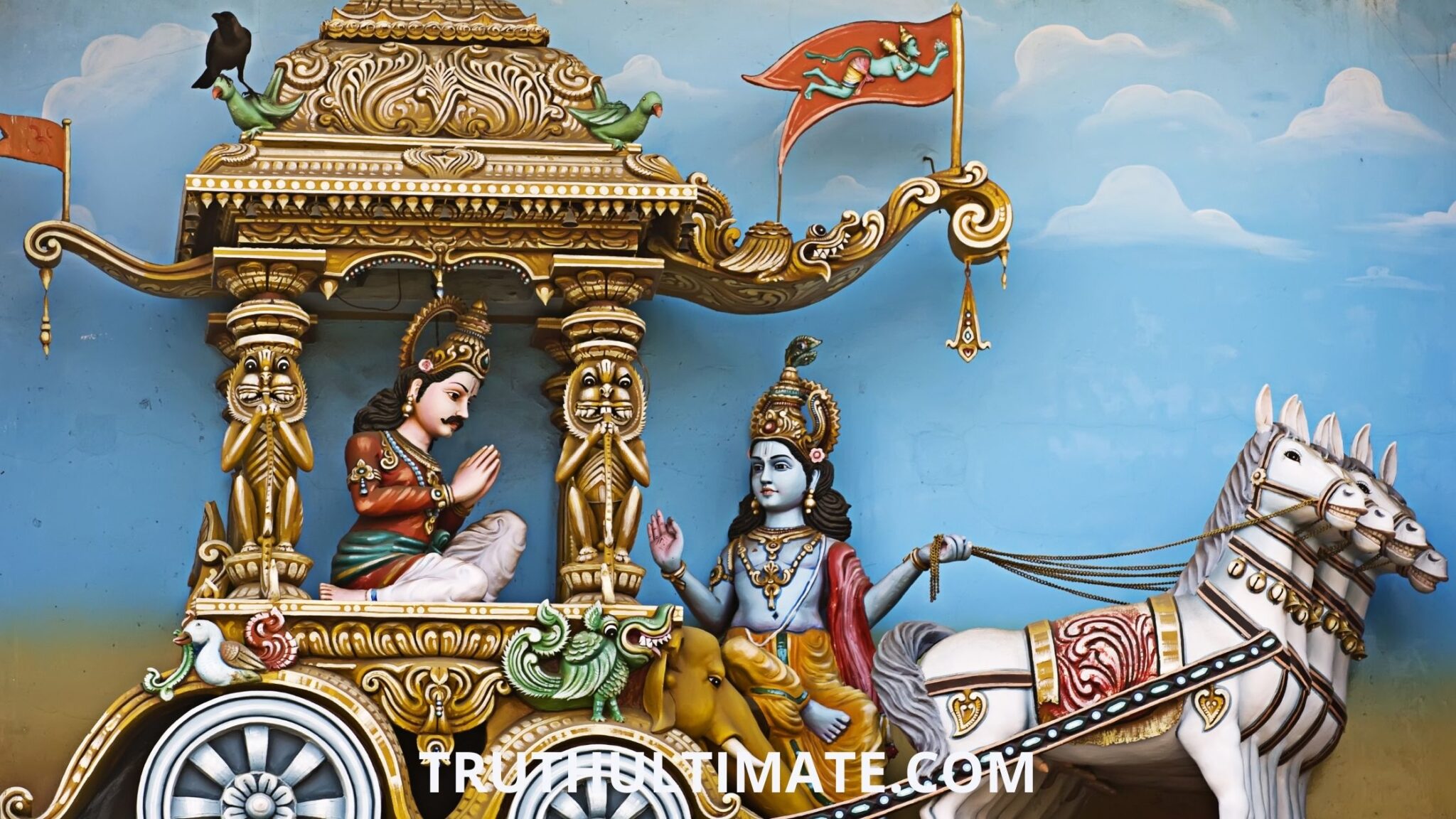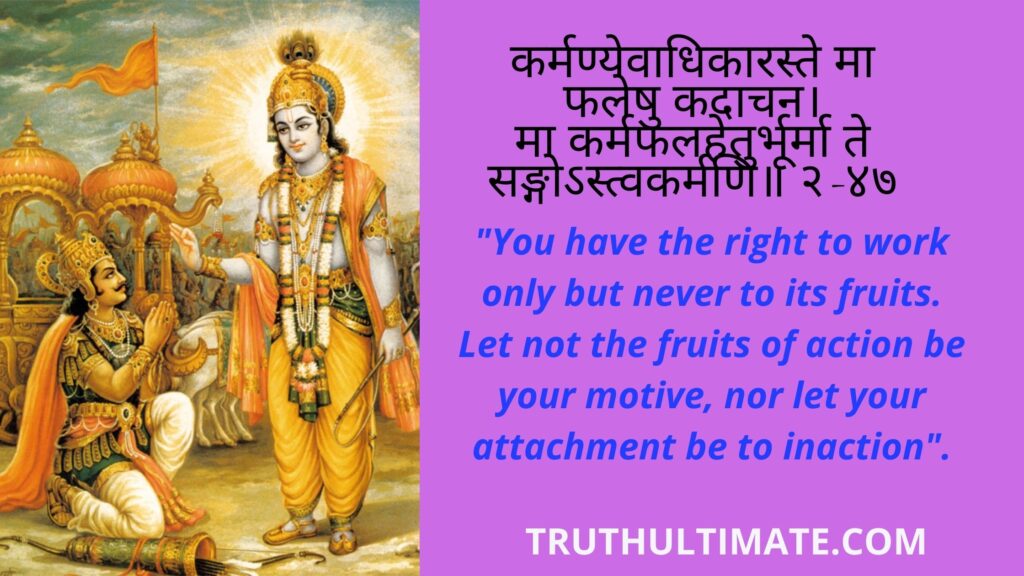
Karmanye Vadhikaraste Ma Phaleshu Kadachana Truth Ultimate
Dirgahayu Korps Paskhas TNI AU, Karmanye Vadikaraste Mafalesu Kadatjana Kompas.com - 17/10/2021, 06:58 WIB 1 1 Lihat Foto Prajurit Paskhas TNI AU saat unjuk kekuatan pada peringatan HUT ke-70 Paskhas di Lanud Adisutjipto Yogyakarta, 17 Oktober 2017. (KOMPAS.com/ALBERTUS ADIT) Anda bisa menjadi kolumnis !

Karmanye Vadhikaraste Movie Download (480p 720p 1080p) HD
The Lord here also emphasizes that inaction (akarmani) is sinful and one should conduct the prescribed duties under all circumstances. Prescribed duties can be categorized into routine work, emergency work, and desired activities.

कर्मण्ये वाधिकारस्ते का हिन्दी अर्थ एवं व्याख्या निष्काम कर्म की व्याख्या Karmanye
Karmanye Vaadhika-raste, Maa Phaleshu Kadachana - Meaning "karmany evadhikaras te ma phalesu kadachana ma karma-phala-hetur bhur ma te sango 'stv akarmani" (Bhagwat Gita: Chapter Two verse 47) "कर्मणये वाधिकारस्ते मां फलेषु कदाचन । मां कर्मफलहेतुर्भू: मांते संङगोस्त्वकर्मणि" ।। (Bhagwat Gita: Chapter Two verse 47)

Essense of Gita...Karmanye Vadhikaraste, Ma phaleshou kada chana, Ma Karma Phala Hetur Bhurmatey
a) Karmanye vadhikaraste: you have a right to work only b) Maa phaleshu kadachana: no right for the fruits thereof. c) Maa karma phla-heturbhuh: let not the fruits be your motive. d) Maa te sangostv akarmani: let not be attached to inaction. "Adhikara" is the most important word in this sloka and we must understand it clearly. It

Karmanye Vadhikaraste Ma Phaleshu Kadachana Slokam Mahabharatham Lord Sri Krishna Sloka Status
Although our this article's topic is Swami Vivekananda's comments and interpretations of the 47th verse of the second chapter of Bhagavad Gita, considering some people from search engine's suggestions will come here to learn about the actual verse, and not Swami Vivekananda's interpretations, we'll start with a brief discussion on the verse

Dirgahayu Korpaskhas yang ke73 *Karmanye,Vadikaraste,Mafalesu,Kadatjana* KOMANDO YouTube
'karmanye vadhika raste, Ma phaleshu kadachana' is famous shloka from Gita. Lord Krishna explains to Arjuna the theory of Karmas. He said believe in yourself and do your Karma (action) and success will follow you automatically. Doing Karma is in our hands only, Result is not in our hands. Below given is meaning of famous Shloka from Bhagavad Gita.

भगवद गीता अध्याय २ पद ४७ Karmanye Vadhikaraste Ma Phaleshu Kadachana in Hindi Geeta Gyan
1 Karmanye Vadhikaraste, Ma phaleshou kada chana Wishing You Happy Janmashtami. This verse is from the Bhagawad Gita, where Arjuna was not willing to fight the Epic war of Mahabhaarat and.

Karmanye Vadhikaraste Ma Phaleshu Kadachana Truth Ultimate
The verse gives four instructions regarding the science of work: 1) Do your duty, but do not concern yourself with the results. 2) The fruits of your actions are not for your enjoyment. 3) Even while working, give up the pride of doership. 4) Do not be attached to inaction. Do your duty, but do not concern yourself with the results.

Karmanye Vadhikaraste Ma Phaleshu Kadachana Truth Ultimate
Karmanye Vadhikaraste Shloka Lyrics in English. Karmanye Vadhikaraste Ma Phaleshou Kada Chana Ma Karma Phala Hetur Bhurmatey Sangostva Akarmani. Karmanye Vadhikaraste Sloka Meaning In English. You have a right to "Karma" (actions) but never to any Fruits thereof.

Karmanye Vadhikaraste for Meditation कर्मण्येवाधिकारस्ते मा फलेसषु कदाचन YouTube
The bird of righteousness cannot be confined in the cage of personal gain. Dharma and selfishness cannot stay together. The desire for fruit takes one to the dark alley of sin and prevents one's real growth. Acting only in one's own self-interest is sinful. The welfare of the individual lies in the welfare of society.

Karmanye Vadhikaraste Ma Phaleshu Kadachana Truth Ultimate
Synonyms karmaṇi — in prescribed duties; eva — certainly; adhikāraḥ — right; te — of you; mā — never; phaleṣu — in the fruits; kadācana — at any time; mā — never; karma - phala — in the result of the work; hetuḥ — cause; bhūḥ — become; mā — never; te — of you; saṅgaḥ — attachment; astu — there should be; akarmaṇi — in not doing prescribed duties.

Karmanye vadhikaraste ma phaleshu kadachana Bhagavad Gita The Gaudiya Treasures of Bengal
English Translation: Karmanye Vadhikaraste Ma Phaleshu Kadachana karmanye vadhikaraste meaning: Karmanya means In the Work or Duty Eva means Only Adhikara means Right Te means Your Ma means Not Phalesu means Fruit or result Kadachana means Ever or at any time "You have every right to work but not expecting fruits out of it.

“Karmanye Vadikaraste Mafalesu Kadatjana” Wahana News
मा /Ma translates to No/Not. फलेषु /Phaleshu means in the fruit/result. The root word of this is "Phal" here which means the fruit of work. कदाचन /Kadachana means Ever but it has some conflicts regarding the meaning as some articles translate it as "never". Basically, Kadachana means ever and Ma means no, so it.

Karmanye Vadhikaraste Ma Phaleshu Kadachana Truth Ultimate
karmaṇyevādhikāraste mā phaleṣu kadācana mā karmaphalaheturbhūrmā te saṅgo'stvakarmaṇi Karmanye Vadhikaraste Meaning In English is as follows: You have the right to perform your karma (prescribed duties), but you are not entitled to the fruits of your karma (actions).

Karmanye Vadhikaraste Ma Phaleshu Kadachana Truth Ultimate
Karmanye Vadhikaraste Meaning of the Shloka from the Bhagavad Gita. mate sangostvakarmani" (Bhagavad Gita Chapter II Verse 47) "You have a right to action alone, never to its fruit. Your motivation should not be fruit of action nor should you be attached to inaction." "You have the right to work and do good deeds, but never to the results.

Karmanye Vadhikaraste Ma Phaleshu Lord Krishna Quotes On Karma
Karmanye Vadhikaraste Ma Phaleshu Kadachana is a Sanskrit phrase that translates to "You have the right to perform your actions, but you are not entitled to the fruits of your actions." This quote is part of a larger verse from the Bhagavad Gita, which is one of the most revered texts in Hinduism.